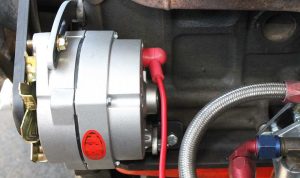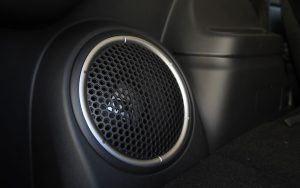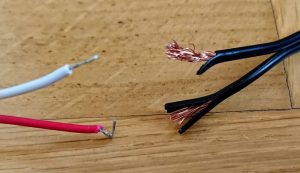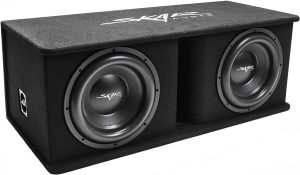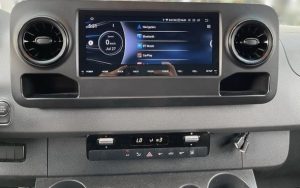Are you experiencing dimming headlights when your bass hits? Or maybe you’ve noticed your car’s electrical system struggling to keep up with your powerful audio setup? You might be wondering if adding a capacitor to your amp is the solution. This comprehensive guide will help you understand everything you need to know about car audio capacitors, their benefits, and whether you actually need one.
Contents
- What Is a Car Audio Capacitor?
- How Car Audio Capacitors Work
- Signs You Might Need a Capacitor
- Capacitor Size: How to Choose the Right One
- Installing a Car Audio Capacitor: Key Steps
- Capacitors vs. Battery Upgrades: Which Do You Need?
- Common Myths About Car Audio Capacitors
- Benefits of Using a Car Audio Capacitor
- Alternatives to Car Audio Capacitors
- Troubleshooting Capacitor Issues
- Making the Final Decision: Do You Need a Capacitor?
- Car Audio Capacitor Brands Worth Considering
- Maintaining Your Car Audio Capacitor
- Final Thoughts on Car Audio Capacitors
What Is a Car Audio Capacitor?
A car audio capacitor is an electronic component that stores electrical energy and releases it quickly when needed. Think of it as a small, fast-acting battery that can deliver instant power to your amplifier during peak demand.
The main purpose of a capacitor in a car audio system is to stabilize voltage during those moments when your amplifier needs a sudden surge of power—typically when playing bass-heavy music at high volume levels. Without sufficient power, your amplifier may struggle, causing issues like dimming headlights, distorted sound, or even potential damage to your car’s electrical components.
How Car Audio Capacitors Work
Car audio capacitors work by collecting and storing electrical charge from your vehicle’s charging system during periods of low demand. When your amplifier suddenly needs more power (like during a bass drop), the capacitor can instantly deliver the stored energy, preventing voltage drops in your car’s electrical system.
This capability makes capacitors excellent for handling short-term, high-current demands—precisely what happens when your subwoofers are reproducing deep bass notes.
Signs You Might Need a Capacitor
Not everyone needs a capacitor for their car audio system. Here are the key indicators that suggest you might benefit from adding one:
- Dimming headlights: When your bass hits hard and your headlights noticeably dim, this is a classic sign that your electrical system is struggling to meet demands.
- High-powered amplifiers: If your amplifier draws more than 1000 watts RMS, your stock electrical system might benefit from the support of a capacitor.
- Sound distortion at high volumes: Unexplained distortion that occurs specifically during bass-heavy passages could indicate power supply issues.
- Multiple amplifiers: Running several amps puts additional stress on your car’s electrical system.
- Competition-level systems: If you’re building a competition-level audio setup, capacitors are often part of the standard equipment list.
It’s important to note that capacitors are not a cure-all solution. They only address specific short-term power delivery issues.
Capacitor Size: How to Choose the Right One
Selecting the appropriate capacitor size is crucial for effective performance. The general rule of thumb is to use 1 Farad of capacitance for every 1000 watts RMS of total system power.
For example:
- For a 500-watt system: 0.5 Farad capacitor
- For a 1200-watt system: 1-1.5 Farad capacitor
- For a 2000-watt system: 2 Farad capacitor or larger
Many audio enthusiasts opt for slightly larger capacitors than the minimum recommendation for better performance. A 2 Farad capacitor for a 1200-watt system provides a good safety margin and better power handling capabilities.
Installing a Car Audio Capacitor: Key Steps
Installing a capacitor requires careful attention to safety. Here’s a basic overview of the installation process:
Safety First!
Capacitors can store a significant electrical charge and can be dangerous if handled improperly. Always discharge a capacitor properly before installation or removal.
Basic Installation Steps:
- Locate an appropriate mounting spot – The capacitor should be mounted as close to the amplifier as possible, in a secure location away from moving parts and extreme heat.
- Discharge the capacitor – New capacitors often come partially charged. Use a resistor (around 10-ohm, 10-watt) to safely discharge it before installation.
- Connect the capacitor to the power line – The capacitor should be wired in parallel with your amplifier, not in series. Connect it to the same power line that feeds your amplifier.
- Connect the ground wire – Ensure a solid ground connection to the vehicle chassis using a short, thick cable.
- Charge the capacitor – Some capacitors include a charging circuit. If not, you’ll need to charge it slowly through a resistor to avoid damaging your electrical system.
- Secure all connections – Double-check that all connections are tight and properly insulated.
For detailed instructions specific to your capacitor model, always refer to the manufacturer’s installation guide.
Capacitors vs. Battery Upgrades: Which Do You Need?
This is a common question among car audio enthusiasts. The answer depends on your specific situation:
When a capacitor is better:
- For handling brief, high-current demands (bass notes)
- When you experience dimming lights only during bass peaks
- For systems under 2000 watts RMS
- When budget constraints make a full electrical upgrade impractical
When a battery upgrade or additional battery is better:
- For sustained high power demands
- For systems over 2000 watts RMS
- When you experience general electrical weakness
- For competition-level systems that play at high volume for extended periods
Sometimes you need both: For very high-powered systems (3000+ watts RMS), a combination approach often works best—upgraded batteries for sustained power delivery and capacitors for instantaneous current delivery during peaks.
Common Myths About Car Audio Capacitors
Several misconceptions exist about what capacitors can and cannot do:
Myth 1: Capacitors increase power Reality: Capacitors don’t create additional power; they only store and release existing power more efficiently.
Myth 2: Capacitors improve sound quality Reality: Capacitors can prevent sound degradation caused by voltage drops, but they don’t directly enhance sound quality if power is already stable.
Myth 3: Bigger is always better Reality: An oversized capacitor won’t harm your system, but it provides diminishing returns and takes up more space unnecessarily.
Myth 4: Capacitors can replace an alternator upgrade Reality: Capacitors handle short bursts of power demand. They can’t fix chronic power shortages that require an alternator upgrade.
Benefits of Using a Car Audio Capacitor
When properly matched to your system’s needs, capacitors offer several advantages:
- Stabilized voltage – Prevents voltage drops during peak power demands.
- Protected lights – Reduces or eliminates headlight dimming.
- Protected electrical components – Helps reduce stress on your alternator and battery.
- Improved amplifier performance – Ensures your amp receives consistent power for better audio reproduction.
- Better bass response – With stable power, your subwoofers can perform more consistently.
Alternatives to Car Audio Capacitors
If you’re considering a capacitor, you should also be aware of alternative solutions that might better address your specific needs:
- High-output alternator – For systems consistently drawing high power, a high-output alternator provides sustainable current increases.
- Additional or upgraded battery – Deep-cycle or AGM batteries can provide more sustained power than stock batteries.
- The Big Three upgrade – Upgrading your car’s main power cables (battery ground, alternator power wire, and chassis ground) often provides significant improvements.
- Power distribution blocks – Better power distribution can maximize the efficiency of your existing electrical system.
These options aren’t mutually exclusive—many high-end systems incorporate several or all of these upgrades.
Troubleshooting Capacitor Issues
Even with proper installation, you might encounter issues with your capacitor:
Problem: Capacitor gets very hot Solution: Check for improper grounding or a fault in the capacitor itself. Excessive heat is not normal.
Problem: Capacitor doesn’t seem to help with dimming Solution: You might need a larger capacitor, or your electrical issues might require a more comprehensive solution like an alternator upgrade.
Problem: Strange noise from the capacitor Solution: This could indicate internal damage. Disconnect it immediately and consider replacement.
Problem: Digital display flickering or not working Solution: Check the power connections to the display. Some capacitors require a separate wire for the display.
Making the Final Decision: Do You Need a Capacitor?
To determine if a capacitor is right for your audio setup, ask yourself these questions:
- Is my issue specifically related to brief power demands (like bass notes)?
- Do my headlights dim only when bass hits?
- Is my system under 2000 watts RMS?
- Is my alternator in good condition but just can’t keep up with brief power demands?
If you answered yes to most of these questions, a capacitor might be a good solution. If your issues are more widespread or your system is very high-powered, you might need to consider more comprehensive electrical system upgrades.
Car Audio Capacitor Brands Worth Considering
If you’ve decided a capacitor is right for you, several reputable brands offer quality options:
- Rockford Fosgate – Known for reliability and build quality
- Stinger – Popular for their range of capacitor sizes and digital displays
- Sound Quest – Good value capacitors with reliable performance
- Planet Audio – Budget-friendly options with decent build quality
- NVX – High-quality capacitors with advanced features
Always choose a capacitor from a reputable brand, as lower-quality units can fail or even pose safety risks.
Maintaining Your Car Audio Capacitor
Once installed, capacitors require minimal maintenance:
- Periodically check connections – Ensure all terminals remain tight and corrosion-free.
- Monitor for unusual heat – Capacitors should not get excessively hot during normal operation.
- Check the voltage display (if equipped) – This can help you identify potential issues with your charging system.
- Keep it clean – Dust and debris can cause heat buildup or electrical shorts.
With proper installation and minimal maintenance, a good quality capacitor can last for many years.
Final Thoughts on Car Audio Capacitors
A car audio capacitor is a valuable component for many car audio systems, especially those experiencing issues with brief power demands. While not a universal solution for all electrical problems, capacitors excel at managing the short-term current spikes that occur during bass-heavy music playback.
Remember that capacitors work best as part of a well-designed electrical system. For truly high-powered audio setups, consider a multi-faceted approach that might include a capacitor alongside other electrical upgrades.
By understanding what capacitors can and cannot do, you can make an informed decision about whether adding one to your system will provide the benefits you’re looking for. When properly matched to your system’s needs, a capacitor can help your audio setup perform at its best while protecting your vehicle’s electrical components.
For best results, consult with a professional car audio installer who can assess your specific situation and recommend the right solution for your unique setup.

